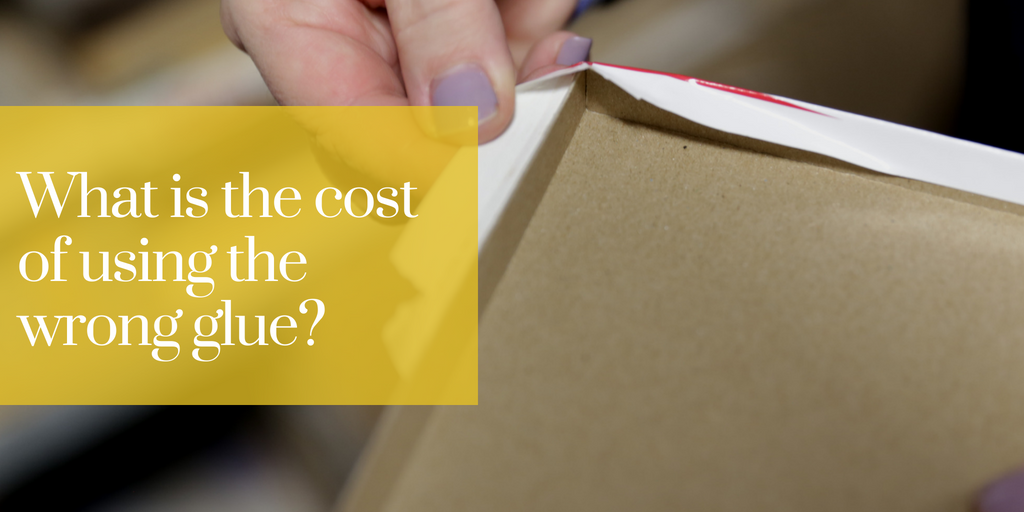Many customers consider the base cost of purchasing glue, but not everyone thinks about the cost of using the wrong type of glue or if you’re using your adhesive properly.
Glue is a small part of a larger project, but if it’s not being applied correctly, it can cause production issues. Not adequately using adhesive can result in the following challenges.
Wasted Time
If your glue formula isn’t right, it won’t bond properly. Most types of industrial adhesive, including gelatin and hot melt, need to be heated before use, requiring time and energy to set up before use. If you apply glue without testing and then find out the adhesive is incorrect, you’ve spent a lot of time applying glue that won’t hold.
Lost Cost
Misapplying glue not only wastes the adhesive but the substrate it's applied to as well.
Equipment Issues
Adhesive equipment is an investment. Most manufacturers recommend using certain glue formulations with their equipment to prevent charing or dripping. Using an unintended mixture of adhesive can slow your production, harm your equipment, and create safety hazards.
Efficiency Issues
If the production line stops, efficiency and productivity are directly impacted. Incorrectly applied glue can hamper production by causing longer dry times, messy seams, pop opens, charing and more.
How to select the right adhesive?
Choosing the best adhesive for your project, especially in manufacturing, requires attention to detail. Small factors can dramatically change how glue functions and if it will work for your application.
Before applying or purchasing adhesive, consider the following questions.
What surfaces are you bonding?
Glue attaches to the surfaces of two substrates to hold them together. Before applying, you need to consider the roughness, smoothness, porosity, coated, uncoated, cleanliness, flexibility, and size of the items you are trying to bond.
For example, our gelatin glue is very popular with manufacturers. However, it works best with porous surfaces like paper stock or wood. This makes it suitable for cardboard box production but does not adhere labels to plastic surfaces well.
What environmental conditions are present?
Think about the whole life span of your product. Environmental conditions like temperature and humidity affect how adhesives cure and perform. Making minor temperature alterations can significantly impact cure speed and storage life.
For instance, gelatin glue is sensitive to temperature. Depending on the environment and time of year, applying the adhesive at a slightly different temperature can dramatically increase production.
What types of stress will the bond experience?
Usually, one of the most critical considerations when selecting an adhesive is the strength of the interfacial bond between adhesive and substrate. Whether you choose gelatin, water-based, hot metal, PUR, or a different type of adhesive, it often comes down to the question of how permanent does the bond need to be?
Water-based and gelatin adhesives are great for laminating and bonding paper products but often lose their hold when moisture is present. Hot melt adhesives are water-resistant but can become melted or softened in the heat. Every glue has benefits and challenges, and the conditions your products undergo will make one adhesive more useful to your production than others.
Testing for Success
If you answered all the questions above, these act as a guide to help you select the right glue. The best way to know for sure is to test!
Adhesive testing is strongly recommended before purchasing or adding it to production. There are many factors to measure, including
- Test temperature
- The glues properties
- Adhesive to substrate
- The contact area
- Types of force applied
- Exposure to heat or moisture
Our experts can work with you to test your adhesive glue formulations. Our full-service research and development lab leverages the technical skill of our experts to create solutions that enhance product performance for customers and save costs.
Need help selecting the right adhesive?
Check out this infographic below.
.jpg?width=1350&name=ldd-wrong-glue-cost-infographic-V1%20(1).jpg)
Our experts are always here to help. If you need assistance finding and testing the right adhesive for manufacturing, contact us.







